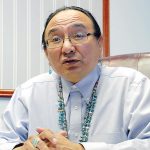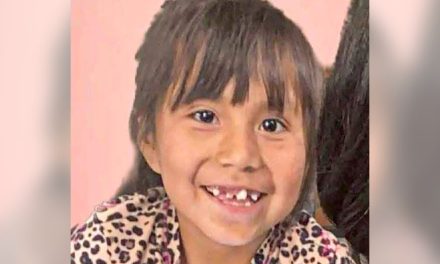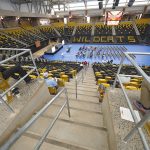
Capital Briefs | New home being built for Korean War veteran
WINDOW ROCK
On April 14, tribal officials visited the site of a new hogan-style home being built in Teecnospos, Arizona, for 89-year-old Korean War veteran Kee Nez.
Nez lost his previous home to a fire. The new two-bedroom home will be completed in several weeks and will have new appliances, running water, and electricity.
In addition to building new homes, the Navajo Veterans Administration is overseeing repairs and improvements to more than 100 homes that were previously constructed between 2014 and 2017.
In 2017, an audit of the Veterans Housing Program found that several homes were not in livable and safe condition.
James Zweirlein, director of the Navajo Veterans Administration, said, “I credit the Veterans Housing Program team with being the boots on the ground. Led by a Navajo veteran from the Fort Defiance agency, Program Supervisor Mrs. Innan Johns, and her staff are the ones pulling this all together. Without their tireless effort, we would not be where we are today.”
This is the third new home, he said, and more than 16 homes have been renovated.
The Navajo Veterans Administration, the president’s office said, worked diligently to pass legislation to update policies that allowed work to begin on new homes in Teecnospos, Tuba City and soon in Red Valley.
More homes for Navajo veterans will be built based on applications that have been submitted over the years, the president’s office said, and with the approval of additional money through the American Rescue Plan Act.
U.S. energy secretary attends roundtable
KAYENTA – On April 14, U.S. Secretary of Energy Jennifer Granholm was welcomed to Kayenta for a roundtable discussion about the Navajo Nation’s renewable energy future.
Included in the discussion was the recent $1.2 million grant awarded by the U.S. Energy Department to construct a solar and battery storage project to provide electricity to 24 Kayenta homes.
Thursday’s meeting was Granholm’s second visit to the Navajo Nation. She was accompanied by Arizona Rep. Tom O’Halleran and Wahleah Johns, Diné, director of the U.S. Office of Indian Energy.
The group toured the Kayenta Solar facility that provides more than 55-megawatts of solar energy to approximately 36,000 Navajo homes.
The group also visited the 24 homes that will benefit from the grant, located in the Comb Ridge/El Capitan communities. The project is estimated to cost $2.8 million, with additional funding from the Navajo Nation.
Ford Foundation supports Native arts, culture councils
OKLAHOMA CITY – The Association of Tribal Archives, Libraries, and Museums has received a two-year grant from the Ford Foundation to test the effectiveness of Native arts & culture councils on tribal lands.
The project will work with existing tribal cultural institutions in six communities to develop cultural plans and establish community-based councils.
Support for arts and culture within Native communities was identified as a top priority during a year-long planning process. The planning was conducted with financial support from the National Endowment for the Arts and the Doris Duke Charitable Foundation.
The study was conducted in partnership with the Native Nations Institute at the University of Arizona.
The Ford Foundation will support work to provide training, resources and guidance from professional consultants, as well as $2,500 grants to support community building processes.
During the pilot phase, six Native communities will be selected through an application process. Priority is granted to communities that have an existing arts and culture presence, support from tribal leaders, and existing cultural institutions. Applications are due April 29.
Information: https://www.atalm.org/node/545
McKinley Co. made history by Incorporating chapter boundaries
ST. MICHEALS – For a long time, according to the Navajo Nation Human Rights Commission, Navajo voting boundaries have not been respected by counties until recently in New Mexico.
During the 2021 legislative session, the New Mexico Legislature adopted Senate Bill 304, which recognized indigenous boundaries such as those for Navajo chapters and directed counties to incorporate indigenous boundaries into precinct boundaries as practically as possible.
In the spring of 2021, the commission started working with New Mexico counties on precinct boundaries to incorporate Navajo chapter boundaries.
McKinley County invited the commission to work with Research and Polling out of Albuquerque to devise new precinct boundaries.
In June 2021, the McKinley County Board of Commissioners adopted new county precinct boundaries that aligned with the Navajo chapter boundaries.
This alignment is intended to allow Navajo voters to go to one polling location on Election Day to cast their ballots for Navajo, county, state and federal elections.
McKinley County made history in the spring of 2021 by recognizing Navajo chapter boundaries, the commission said.
Council marks passing of Harry Willeto
On April 15 the Navajo Nation Council sent condolences to the family of Ojo Encino leader and former delegate Harry Willeto, who passed away Tuesday, April 12.
Willeto was born Jan. 3, 1942, in Pueblo Alto near Farmington and Bloomfield, He was Naakai Dine’é, born for Tódich’ii’nii. He was married to Virginia Willeto for more than 57 years.
Since the age of 21, Willeto served as a advocate working for emergency medical services to be delivered to rural areas across the Navajo Nation.
In 1991, he was elected to the Navajo Nation Council and served for 20 years as a delegate. He served on the Ethics and Rules and Public Safety committees.
Health, Education, and Human Services Committee Chairman Daniel Tso will present a Navajo Nation Flag to the family to honor his years of service to the Navajo people and the citizens of New Mexico.
Speaker Seth Damon said, “He leaves behind a legacy of public service to the Navajo people serving the Eastern Agency as Counselor Chapter president for years. Mr. Willeto was a humble man who deeply loved his family and the communities he served.”
Applications open for 3 health care training programs
TUBA CITY – Tuba City Regional Health Care Center is accepting students for three training programs in a growing medical field: medical coding, medical billing, and service help desk representative trainee.
Applications for all three are due May 6.
The medical coding and billing training program are 16-week programs and run from June 6 to October.
The service help desk representative training is a seven-month program and runs from June 6 to December.
“This is the first time these training programs are being offered by Tuba City Regional Health Care Corporation,” said Earleson Peacock, TCRHCC career development coordinator.
“The training programs are a competitive process and are offered at no cost to qualified candidates.”
The free training program is offered through a health disparities grant from the Arizona Department of Health Services.
Applicants must submit a 450- to 500-word essay, complete a background check, fingerprint clearance, and pass a drug screening test.
“A two-year service agreement with TCRHCC is also required,” said Peacock.
Information: 928-283-2432.







 Highway 264,
Highway 264, I-40, WB @ Winslow
I-40, WB @ Winslow